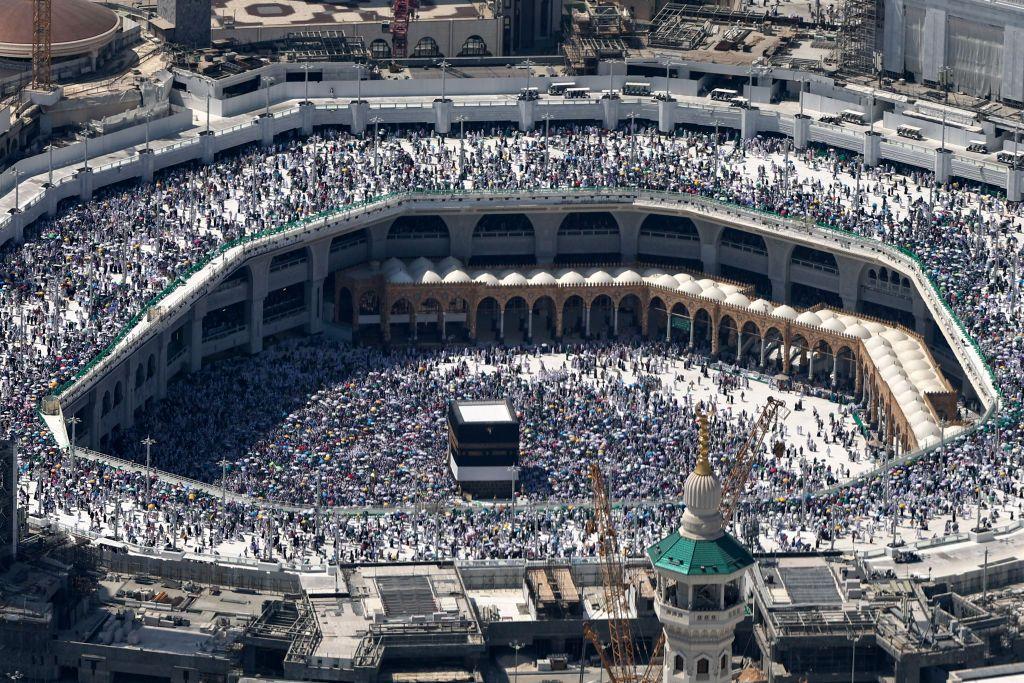‘Unregistered’ persons wishing to perform Hajj can reach Makkah and arrange accommodation there, but in some places they do not have transport, accommodation and food facilities, which makes it even more difficult to perform Hajj.
Although every Muslim aspires to perform Hajj, only about two million Muslims are able to perform Hajj in a year.
Saudi Arabia says that about 1.8 million people performed the Hajj this year, but these figures do not include those who violated the official Hajj practices set by the Saudi authorities to perform the Hajj in the country. Enter with intent.
Hundreds of people died during the Hajj this year in Saudi Arabia, most of whom died due to extreme heat as the temperature exceeded 51 degrees Celsius.
According to the AFP news agency, more than half of the dead were ‘unregistered’ pilgrims who joined the Hajj through ‘illegal means’, denying them access to facilities such as air-conditioned tents and air-conditioned buses. Couldn’t.
Here the question arises, what are the reasons due to which some people are forced to adopt an illegal way to fulfill a religious duty?
What are these illegal methods and what facilities do the pilgrims who adopt these methods lose while performing their religious duties?
How is Hajj possible on Umrah or tourist visa?
Prof. Sajjad Qamar has been holding the position of Advisor to the Ministry of Religious Affairs in Pakistan. Speaking to the BBC’s Sana Asif Dar, he said that many people perform Hajj on Umrah or tourist visas, which is an illegal method.
He said that ‘Umrah is allowed on a visit visa by the Saudi government and many people do it, but Hajj is not allowed on a visit visa and the Saudi government specifically forbids it.’
Prof. Sajjad Qamar explained that ‘in the months of Dhul-Qa’d and Dhul-Hijjah, foreigners are not allowed to land at Jeddah Airport on a visit visa to reach Saudi Arabia, but a person with a visit visa can go to the airports of Madinah Munawara, Riyadh, and Dammam. can.’
According to Professor Sajjad, ‘People who do not have a Hajj permit and a visit visa, then they reach Saudi Arabia through other cities and upon reaching there, they join some Hajj group.’
For example, if someone is going from Karachi, Pakistan, he joins private Hajj groups. People without wearing Ihram reach Madinah, Taif or other cities and join the Hajj.
What facilities are deprived of such pilgrims?
According to Professor Sajjad Qamar, people are not registered anywhere without a Hajj permit.
“Like in Pakistan they are not part of any government scheme, not part of any private Hajj group, so they arrange some things, like reaching Makkah and then arranging accommodation there.”
However, according to him, they do not get any facilities (accommodation, food, transport) at the places of Muni, Muzalfa, Mushaira and Arafat, which are available to registered pilgrims because all the arrangements at these places are done by the Saudi government.
Prof. Sajjad Qamar further said that ‘some people take a place in the tent because of their acquaintances and relations, but there are a large number of pilgrims who do not have access to the tent.’
‘There is little room inside a tent anyway and there is no extra room for even one servant. Such people are out on the streets and roads. Such people are affected by the weather, especially the heat, and get sick, as happened this time.’
According to Professor Sajjad Qamar, this is not a new thing, but it is a normal thing, it has been happening for many years and the number of Hajj pilgrims in this way is very high, but this time due to the heat, this matter has come to the fore.
Also read this
- ‘I lost my money and opportunity to perform Hajj’: How fraudsters cheat in the name of ‘fake Hajj permits’ and ‘cheap packages’
- Hajj ‘smuggling’: ‘We were forced to perform Hajj by fraud’
- Deaths of Egypt’s unregistered pilgrims: ‘Whenever I spoke to my mother, she was pouring water on her head, at the last call she was passed out from exhaustion’
What are the reasons for performing Hajj illegally?
According to a report by BBC Arabic, many reasons make some people choose different methods, the most prominent ones being economics and age.
The cost of Hajj is what prompts some people to perform Hajj without official permission.
It should be noted that in the year 2020, the government took about five lakh rupees per person from the people going to Pakistan to pay the Hajj, which went up to seven hundred and ten thousand rupees in 2022 and in 2023 this amount was 12 lakh. It was around Rs.
According to the National Foundation for Hajj Facilitation in Egypt, the cheapest Hajj program costs 191,000 Egyptian pounds, which is about 4,000 US dollars, while the cheapest package for Hajj by plane costs 226,000 Egyptian pounds.
The Hajj fee in Jordan costs about 3,000 dinars, equivalent to four thousand two hundred US dollars, while the cost of ‘smuggling’ a pilgrim through a visit visa is about one thousand dinars (about $1,400). For some other illegal pilgrims in Jordan, the same amount can reach two thousand dinars, or about $2,800.
On the other hand, the official land Hajj from Jordan costs around 3,090 dinars, and with flights and five-star hotels located within 500 meters of the courtyards of the Prophet’s Mosque, this amount goes up to 4,700 dinars.
What is the Nisq card and what is the Saudi government doing to stop ‘illegal Hajj’?
According to the Saudi Ministry of Interior, no one is allowed to enter Makkah under a visit visa during the Hajj season. Saudi Arabia’s National Committee for Hajj and Umrah adviser Saad Al-Quraishi told the BBC that “whoever does not have a Hajj visa, he will not be tolerated here and should go back to his country.”
He said that ‘Nisak’ cards are used to identify pilgrims which are given to official pilgrims and contain barcodes to enter holy places. He explained that some people tried to make such fake cards but failed. Al-Quraishi also confirmed the expulsion of the illegals by the security personnel.
“The residential apartments where the violators are are raided, they are evicted and they are sent from Makkah to Jeddah area from where they are sent to their countries,” he said. goes.’
According to al-Quraishi, ‘Some people extort money from pilgrims and encourage them to use visit visas for Hajj, even though these visas are not allowed to perform Hajj.’
Professor Sajjad Qamar while talking about the Saudi measures said that the Saudi government regularly issues handouts every year, the Saudi government also informs the governments of other countries around the world that Hajj is not allowed on a visit visa. .
This time, the Saudi government announced this very strongly. Saudi Arabia’s Minister of Hajj Tawfiq al-Rabi’a himself announced that Hajj is not allowed on a visit visa.
He further said that the Saudi government has also strictly obliged its citizens that whoever does not have a Hajj permit and tries to perform Hajj will be fined, while for foreigners, the next 10 years or Entry is permanently closed, but people still perform Hajj illegally.
According to Professor Sajjad Qamar, there are 20 to 25 lakh people on the occasion of Hajj, so it is very difficult to identify unregistered people among them.
What is the position of scholars about this?
The Council of Senior Scholars in Saudi Arabia has confirmed that the Hajj permit is in accordance with Sharia and has clarified that ‘it is not permissible to go on Hajj without obtaining permission and whoever does so is a sinner.’
In Egypt, the secretary of the Fatwa House, Dr. Muhammad Abdul Sami, affirmed that ‘one who goes to perform Umrah and hides while waiting for the season of Hajj, commits a sin according to the Shari’ah because it is not permissible but his Hajj and Umrah. That’s right.’
He explained that ‘this case is similar to someone who stole a bottle of water to perform ablution for prayer.’
Explaining this, he said that his prayer is correct but he is committing the sin of taking water illegally.
In a video posted by the Egyptian Fatwa House on its official Facebook page, in response to a question about the ruling on Hajj without permission, he stressed that Hajj without permission causes many problems. According to him, ‘If the number (of pilgrims) increases, it will result in the problems of Hajj such as crowding and the resulting problems.’ (Ref: BBC Urdu)





